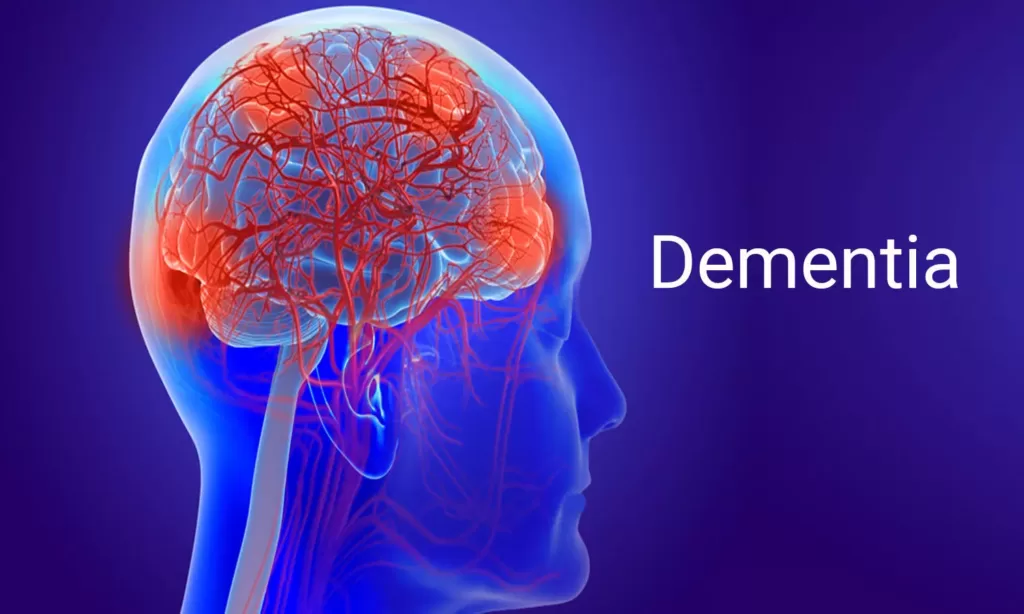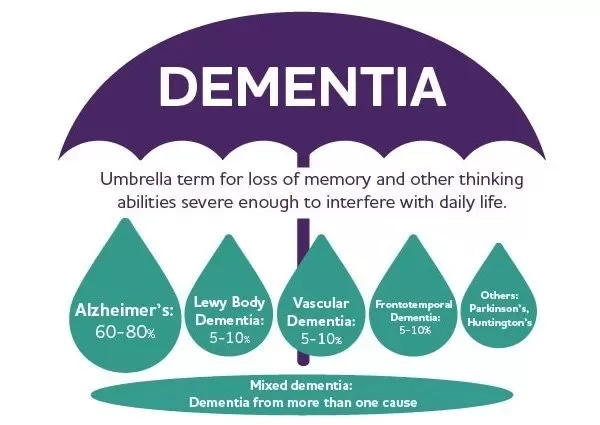Dementia is a broad term that refers to a group of neurological disorders that affect cognitive function, including memory, thinking, and reasoning. It is a progressive condition that usually occurs in older adults, although it can also occur in younger people. Dementia is caused by damage to brain cells, and the symptoms of the disease vary depending on the part of the brain that is affected.
The most common cause of dementia is Alzheimer’s disease, which accounts for approximately 60-80% of all cases. Other causes of dementia include vascular dementia, Lewy body dementia, frontotemporal dementia, and Creutzfeldt-Jakob disease. In many cases, the cause of dementia is unknown.
symptoms of dementia
The symptoms of dementia can be divided into two main categories: cognitive symptoms and behavioral symptoms.
Cognitive symptoms include:
- Memory loss: Dementia patients often have trouble remembering recent events, as well as long-term memories.
- Language problems: Dementia can cause difficulties in finding the right words to use or understanding what others are saying.
- Difficulty with complex tasks: Dementia patients may struggle with tasks that require planning or problem-solving, such as following a recipe or balancing a checkbook.
- Confusion: Dementia patients may become easily disoriented or confused, especially in unfamiliar environments.
- Poor judgment: Dementia can cause patients to make poor decisions, such as giving away money to strangers.
- Personality changes: Dementia patients may become withdrawn, apathetic, or exhibit aggressive behavior.

Behavioral symptoms include:
- Agitation: Dementia patients may become restless, anxious, or agitated, especially in the late afternoon or evening.
- Delusions and hallucinations: Some dementia patients may experience delusions or see or hear things that are not there.
- Depression: Dementia patients may become depressed or withdrawn.
- Sleep disturbances: Dementia patients may have trouble sleeping or experience nighttime wandering.
- Loss of inhibitions: Dementia can cause patients to act inappropriately, such as undressing in public.
- Incontinence: Dementia can cause patients to lose control of their bladder or bowels.
It is important to note that not all patients with dementia will exhibit all of these symptoms, and the severity of symptoms can vary from person to person. Additionally, dementia can progress at different rates in different individuals.
Diagnosing dementia typically involves a combination of medical and neurological assessments, including physical exams, cognitive tests, and brain imaging. There is currently no cure for dementia, but treatment can help manage symptoms and improve quality of life. Medications can be prescribed to help with cognitive symptoms, while therapy and social support can help manage behavioral symptoms.
It can be said that dementia is a progressive neurological disorder that affects cognitive function, including memory, thinking, and reasoning. The most common cause of dementia is Alzheimer’s disease, but there are other types of dementia as well. Symptoms of dementia include memory loss, language problems, confusion, poor judgment, personality changes, agitation, delusions, hallucinations, depression, sleep disturbances, loss of inhibitions, and incontinence.
Diagnosis involves a combination of medical and neurological assessments, and treatment typically involves medications, therapy, and social support.
What age group people generally have dementia
Dementia is a condition that typically affects older adults, with the risk increasing as people age. According to the World Health Organization (WHO), the prevalence of dementia doubles every five years after the age of 60, with the majority of cases occurring in individuals aged 65 and older. However, it is important to note that dementia can also occur in younger people, although this is less common.
There are several reasons why older adults are at greater risk for developing dementia. One reason is that as people age, their brains undergo a number of changes that can increase the risk of cognitive decline. For example, the brain’s blood vessels may become less efficient, reducing the flow of oxygen and nutrients to brain cells. Additionally, the brain’s structure may change, with areas of the brain shrinking or losing connections between neurons.
Another factor that may contribute to the higher incidence of dementia in older adults is the accumulation of risk factors over time. For example, individuals who have high blood pressure, high cholesterol, or diabetes may be at increased risk for developing dementia. These conditions can damage blood vessels and increase inflammation in the brain, which can lead to cognitive decline.
Genetics may also play a role in the development of dementia, although the relationship is complex. While there are certain genetic factors that can increase the risk of developing dementia, such as the APOE gene, genetics alone is not usually sufficient to cause the condition. Rather, genetics may interact with other factors, such as age and lifestyle, to increase the risk of cognitive decline.
It is worth noting that while dementia is more common in older adults, not everyone will develop the condition as they age. Lifestyle factors, such as diet, exercise, and social engagement, can play an important role in maintaining cognitive function and reducing the risk of cognitive decline. Additionally, early diagnosis and treatment of conditions that can contribute to cognitive decline, such as high blood pressure and diabetes, can help to prevent or delay the onset of dementia.
What are the available treatments for dementia
There is currently no cure for dementia, but there are several treatments available that can help manage symptoms and improve the quality of life for individuals with the condition. The available treatments for dementia can be divided into three main categories: medications, non-pharmacological interventions, and supportive care.
Medications:
There are several medications that can be prescribed to help manage the cognitive symptoms of dementia, particularly in the early stages of the disease. These medications work by increasing the levels of certain neurotransmitters in the brain, which can improve memory, thinking, and other cognitive functions. The most commonly prescribed medications for dementia are cholinesterase inhibitors, such as donepezil, rivastigmine, and galantamine.
These medications can be particularly effective in individuals with mild to moderate dementia. Another medication, memantine, is sometimes prescribed for moderate to severe dementia. Memantine works by blocking the activity of a chemical in the brain called glutamate, which can contribute to cognitive decline.
Non-pharmacological interventions:
There are several non-pharmacological interventions that can be used to manage the behavioral symptoms of dementia. These interventions can be particularly effective in individuals with moderate to severe dementia. Some examples of non-pharmacological interventions include:
- Cognitive stimulation therapy: This involves engaging individuals with dementia in activities and exercises that are designed to improve cognitive function and promote social interaction.
- Reality orientation therapy: This involves helping individuals with dementia maintain their sense of reality and connection to the world around them through verbal cues and other sensory stimuli.
- Music therapy: This involves using music to promote relaxation, reduce agitation, and improve mood in individuals with dementia.
- Behavioral therapy: This involves working with individuals with dementia and their caregivers to identify triggers for behavioral symptoms and develop strategies for managing these symptoms.

Supportive care:
Supportive care is an important part of managing dementia and can include a range of services and interventions aimed at promoting the well-being of individuals with the condition and their caregivers. Some examples of supportive care interventions include:
- Education and training for caregivers: This can involve providing caregivers with information and training on how to manage the symptoms of dementia, including behavioral symptoms.
- Respite care: This involves providing temporary relief for caregivers by arranging for someone else to care for the individual with dementia for a period of time.
- Home modifications: This can include making changes to the home environment, such as installing grab bars or removing tripping hazards, to improve safety and mobility for individuals with dementia.
- Support groups: These can provide individuals with dementia and their caregivers with a sense of community and social support.
We may infer, while there is currently no cure for dementia, there are several treatments available that can help manage symptoms and improve the quality of life for individuals with the condition. These treatments include medications, non-pharmacological interventions, and supportive care.
The choice of treatment will depend on the individual’s symptoms, the stage of the disease, and other factors such as age and overall health. It is important for individuals with dementia and their caregivers to work closely with healthcare professionals to develop a comprehensive care plan that addresses their unique needs and goals.
How we can prevent dementia
While there is currently no surefire way to prevent dementia, there are several lifestyle factors that have been shown to reduce the risk of cognitive decline and dementia. By making changes to their diet, exercise routine, and other aspects of their lifestyle, individuals can help to protect their brain health and reduce their risk of developing dementia.
- Exercise regularly:
Regular exercise has been shown to be one of the most effective ways to reduce the risk of cognitive decline and dementia. Physical activity can improve blood flow to the brain, stimulate the growth of new brain cells, and promote the production of neuroprotective proteins. Aim for at least 30 minutes of moderate-intensity exercise, such as brisk walking or cycling, on most days of the week.
- Follow a healthy diet:
A healthy diet can help to protect the brain by providing it with the nutrients it needs to function properly. Some research suggests that a Mediterranean-style diet, which is rich in fruits, vegetables, whole grains, and healthy fats, may be particularly beneficial for brain health. Avoid or limit intake of processed foods, saturated and trans fats, and added sugars.
- Stay socially engaged:
Social engagement has been linked to better cognitive function and a reduced risk of dementia. Stay connected with friends and family, volunteer, join clubs or organizations, or participate in other activities that keep you socially engaged.
- Keep your brain active:
Engaging in mentally stimulating activities, such as reading, playing games, learning a new skill, or taking classes, can help to keep the brain active and may reduce the risk of cognitive decline.
- Manage chronic conditions:
Conditions such as high blood pressure, diabetes, and high cholesterol can increase the risk of cognitive decline and dementia. Work with your healthcare provider to manage these conditions and keep them under control.
- Get enough sleep:
Getting enough sleep is important for brain health. Aim for seven to eight hours of sleep per night, and try to establish a regular sleep schedule.
- Avoid or limit alcohol and tobacco:
Both alcohol and tobacco have been linked to an increased risk of cognitive decline and dementia. Avoid or limit alcohol intake, and if you smoke, consider quitting.

In conclusion, while there is no surefire way to prevent dementia, there are several lifestyle factors that can help to reduce the risk of cognitive decline and promote brain health. By exercising regularly, following a healthy diet, staying socially engaged, keeping the brain active, managing chronic conditions, getting enough sleep, and avoiding or limiting alcohol and tobacco, individuals can help to protect their brain health and reduce their risk of developing dementia.
Disclaimer: The author’s views are his or her own. The facts and opinions in the article have been taken from various articles and political commentaries available in the online media and Eastside Writers does not take any responsibility or obligation for them.
Note: Contact our Writers at www.eastsidewriters.com for writing Blogs/Articles on any niche. We have experts in various domains from Technology to Finance and from Spirituality to Lifestyle and Entertainment.







Pingback: From Genetics to Lifestyle: Unveiling the 11 Surprising Culprits Behind Hair Loss - Eastside Writers
Pingback: Cure Alzheimer’s Disease with These Foods in Your Diet - Eastside Writers